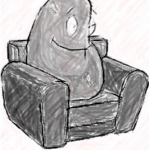Following her experience as a youth delegate from Cyprus at the EU Youth Conference in Riga, Latvia (March 2015) Chloe prepared the following article on the importance of youth participation in decision making.
 Despite the fact that we do not want to admit it, we are a couch potato generation. The fact that “social media” appears under almost all sections of our CV (interest, skill and qualification) does not make the hours we spent in front of our laptop, TV, or PlayStation more productive and it definitely does not make us look more sophisticated.Here is a question for you that you are young, full of energy and ambitions, with the sky as your limit. What –if anything- is it that connects you with the society you live in? Think of three scenarios.
Despite the fact that we do not want to admit it, we are a couch potato generation. The fact that “social media” appears under almost all sections of our CV (interest, skill and qualification) does not make the hours we spent in front of our laptop, TV, or PlayStation more productive and it definitely does not make us look more sophisticated.Here is a question for you that you are young, full of energy and ambitions, with the sky as your limit. What –if anything- is it that connects you with the society you live in? Think of three scenarios.
The first is the case where you stay passive in what is happening around you, and you do not have any expectation to be taken seriously.
The second is where your ideas are developed and opinions voiced and discussed at a table, different from the one of the policy makers’, and where those ideas and views do not have access in the real decision-making process. And the third, when you sit next to the very same policy makers and co-decide with them on issues that directly affect and influence you.
The third scenario is of course what we strive for. It is important for all of us to realise that if we want to have a direct impact on the society we live in we have to leave our comfy couch and comfort zone and get in action. Yet, it is also fair to observe that having an opinion is most of the times important but not sufficient if this opinion is not a
mandatory input in the decision-making process.
The 2009 European initiative …
The lack of challenge in communication between young people and policy-makers had been recognized and addressed by the European Council Resolution of 2009 that set up a renewed framework for European Cooperation in the Field of Youth. In consequence, Member States agreed on the implementation of the “Structured Dialogue” program which is a tool that aims to empower youth to speak their minds and express their concerns on issues that have a direct impact on them such as youth employment, education and social inclusion by acting as a platform of communication or dialogue between young people and policymakers.
The dialogue between the two sides, however, is structured. The process is organized in 18-month sessions corresponding to a trio team Presidency of the Council of the EU and having a common thematic priority. Each session consists of three distinct but interrelated phases under each of the three Team Presidency countries and examines the common topic through different angles in each country.
The first phase …
Firstly, the European Steering Committee, which is made up of the European Youth Forum, the European Commission, the National Youth Councils and national authorities of the trio Team Presidency, decides upon the general Guiding Framework which lays down the foundation upon which each session will be built on.
The first phase of the running Session, which took place in Rome (Italy), decided the focus to be on youth’s empowerment through their involvement in political participation. Subsequently, the first of the team Presidency Country, Italy in this case, sent the Framework in the form of questions to the National Working Group of each Member State, which is then responsible for carrying out the national consultations. These are usually achieved in a number of ways such as staging face-to-face public consultations in urban and rural areas as well as through electronic questionnaires.
Indeed, Cyprus has carried out all the aforementioned types of consultations, which it then sum up in a report that it sent to the European Youth Forum together with all the other countries. The reports were then compiled together in order to form the basis of the most intriguing stage of this process: the EU Youth Conference.
The second phase The EU Youth Conference, which is the second phase of the session, and which for this Session was organized in Riga (Latvia), is particularly important as it brings together more than 200 youth and policy makers to discuss, exchange views and ideas and reach common recommendations. This event offers the opportunity to youth and policy makers to come together and jointly discuss and decide on a specific priority of mutual concern. Having the honour and pleasure to participate in the Riga EU Youth Conference, I can confidently say that this phase is the very essence of Structured Dialogue “in action”. This is because young people and policy makers discuss together the issue in a number of workshops that concentrate on a specific aspect of this priority. They sit down as equals and push the dialogue forward while meeting, networking and socialising with their peers.
The recommendations of each workshop that were concluded in Riga and will soon be sent in Luxemburg can be found here: Joint_recommendations_20150326
The third phase …
What is expected after the completion of the second phase and after the discussions of youth and policy makers, is the genesis of a series of joint recommendations in Luxemburg, which will contribute to the drafting of the political decisions of the EU Council. What does this mean? It actually means that Structured dialogue transforms our voice into political action and tangible results.
It is in our hands …
What we should do is participate in any way we can in this fruitful process. Be it by completing e-questionnaires, attending national consultations or even representing our country at an EU Youth Conference. This new program could be a dawn of a new age in youth policy and political participation as it will allow the voice of youth to be heard and will guarantee us a seat at the discussion table to express freely our voice as proactive European citizens, contributing to direct tangible political results. What we do need to do is to take the life in our hands and turn the youth from a couch potato generation to the world’s next leaders.

